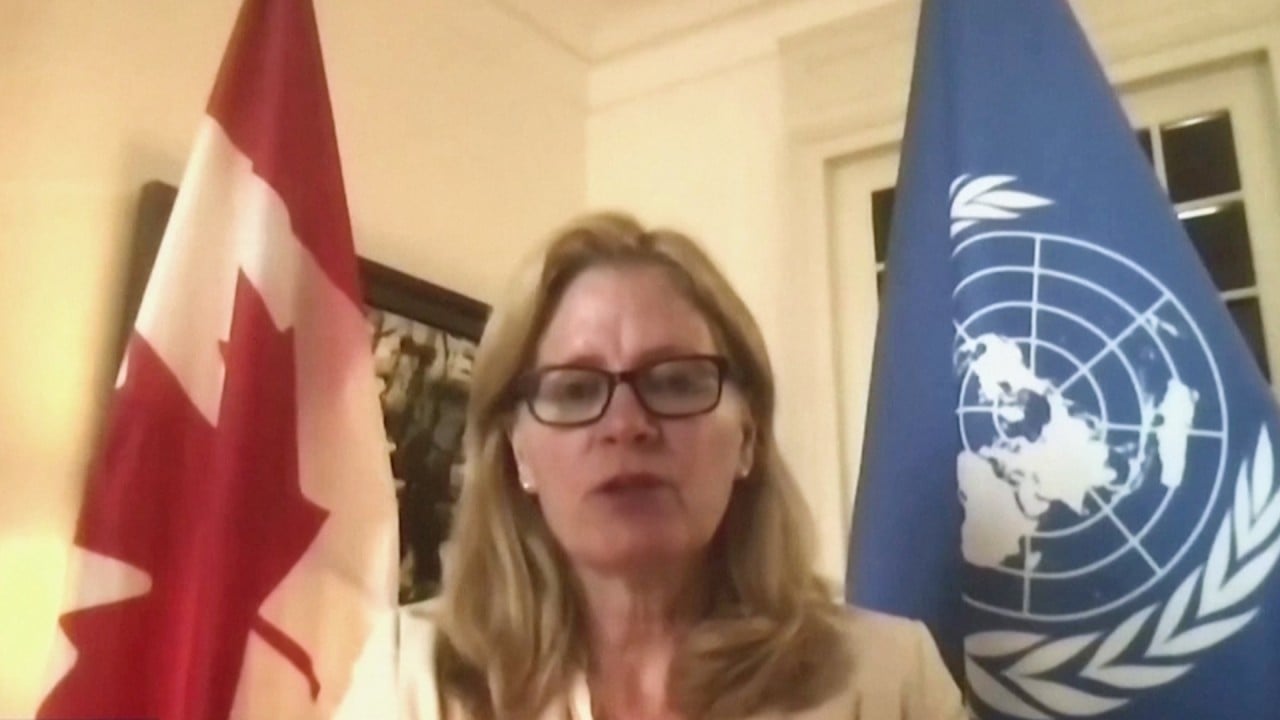
Biden links policies targeting Uygurs in Xinjiang to the Holocaust
- ‘We see today the patterns, the choices, playing out around the world, even as we speak,’ says the US president
- The Biden administration has emphasised repeatedly since taking office that it views human rights as a central pillar of American foreign policy
“The ability of the human mind to rationalise cannot be underestimated,” Biden said.
The Biden administration has emphasised repeatedly since taking office that it views human rights as a central pillar of American foreign policy – including the US relationship with Beijing.

01:11
Canada leads call by more than 40 countries for China to give UN access to Xinjiang
Beijing denies all allegations of human rights violations, and accuses the US of interfering in China’s internal affairs.
Biden spoke at the dedication ceremony for the Dodd Centre for Human Rights at the University of Connecticut.
Xinjiang’s debt-heavy state firms pose hidden risk to local government
The centre is named after Biden’s former US Senate colleague Chris Dodd and his father, the former senator Thomas Dodd, who prosecuted Nazi war criminals at the Nuremberg Trials after World War II.
Biden said the Nuremberg Trials forced the world to look closely at “what we’re capable of perpetrating, to see mass atrocities, crimes against humanity, do not happen by accident, they don’t happen by accident”.
“The result of choices – choices made by individual human beings and world leaders.”
Biden also spoke of the Rohingya ethnic minority group in Myanmar in his speech, describing “rampant abuses, including the use of starvation and sexual violence to terrorise civilian populations”.

As the crisis worsens in Myanmar following a February coup by the military, senior US administration officials also said Friday that an inter-agency delegation would travel to Singapore, Thailand, Indonesia and Japan to discuss the issue next week.
The inter-agency delegation is made up of the State Department, National Security Council, US Mission to the United Nations and the US Agency for International Development.
Speaking on background, the officials said the trip, led by State Department Counselor Derek Chollet was organised to confer with allies about that country’s ongoing violence and humanitarian calamity, and to discuss China and the importance of a “rules-based order”.
They said China can play an important role in the Myanmar crisis, adding that Washington has urged Beijing to work with all regional players in securing the release of detained Burmese citizens and help put the country back on the road to democracy.
US judge rejects Esquel request to remove Xinjiang unit from ‘entity list’
The officials added that they would also use the trip to speak with allies more generally about the People’s Republic of China (PRC), following on separate recent trips by Vice-President Kamala Harris and Defence Secretary Lloyd Austin to Southeast Asia, as well as ministerial meetings in Washington and New York in and around the United Nations General Assembly.
“We’re going to be talking about our perspective on the PRC and the challenges that their behaviours are posing in the region and more broadly,” one senior official said.
“The US relationship with China is very complex. It’s something that is not easily relegated to a bumper sticker or, if you tried to do that, it would be a pretty long bumper.”

01:08
Xinjiang, China’s top cotton producer
Biden’s speech was the latest signal from the administration that it sees human rights as a top priority in its foreign policy.
What is China’s ‘pairing assistance’ that sends money, talent to Xinjiang?
China’s foreign ministry countered Friday that Washington should rethink its own human rights policies.
“If the US carries on adopting double standard, politicising human rights issues and attacking and suppressing other countries, then it will meet strong opposition from the international community,” said spokesman Zhao Lijian.
Meanwhile at an earlier event on Friday, Biden spoke about his “Build Back Better” spending plan to fund US infrastructure as China’s President Xi Jinping “doesn’t think democracies can compete because they can’t act quickly enough”.

“They don’t measure us on how much power we have that way,” he added. “They want to know can we get anything done.”
Asked whether the US would intervene militarily if China’s People’s Liberation Army invaded Taiwan, White House Press Secretary Jen Psaki said that the US “will continue to oppose any unilateral changes to the status quo”.
“Our support for and defence relationship with Taiwan remains aligned against the current threat posed by the People’s Republic of China,” Psaki said, adding that she was “not in a position to comment on specific operations, engagements or training”.
Additional reporting by Robert Delaney


